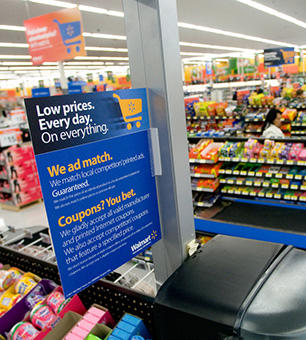Honest, paywall-free news is rare. Please support our boldly independent journalism with a donation of any size.
Washington, DC – Proponents of a proposed higher “living wage” requirement for workers at large retailers here in Washington are stepping up their campaign, urging the city’s mayor to sign pending legislation into law.
Dozens of other U.S. cities have enacted similar laws, which increase minimum wages at those businesses covered by the legislation by around 50 percent. Yet the legal battle here has garnered national attention because it appears to be aimed at one company in particular – Walmart.
“We will give the mayor our support if he has the backbone to sign the bill,” Reverend Graylan Hagler, president of Faith Strategies, a religious group here that has led demonstrations in support of the living wage bill this week, told IPS.
“To cave in to the threat of this corporation is to send a mixed message to the public that somehow corporations can come in and damage our sense of self-respect.”
Walmart, which has been criticised for years for paying its employees and suppliers notably low rates, had previously announced plans to build six stores in the Washington area, its first stores in the city. But it also warned that it would halt those plans on at least three stores (three others are under construction) if the living wage legislation were passed.
“This is a difficult decision for us – and unfortunate now for most D.C. residents – but the council has forced our hand,” Walmart spokesperson Steve Restivo said in a statement.
Last week, the Washington city council passed the so-called Large Retailer Accountability Act, and sent it on to Mayor Vincent Gray. The bill requires all indoor stores of 75,000 square feet or larger, and with a parent company that has a gross revenue of at least one billion dollars, to pay their employees a minimum of 12.50 dollars an hour, minus benefits.
After the vote, Walmart made its threat to pull out of the area.
“With the passage of the Large Retailer Accountability Act, any future plans for retail expansion in the city must be revisited,” stated a letter from the company.
“Arbitrary conditions that subject our stores to rules that other employers, including countless competitors, are not equally subjected to unfairly distort the marketplace and are cause of grave concern.”
Since the vote, several other large retail stores that may be affected by the law – including Autozone, Lowe’s, Home Depot, Macy’s, Target and Walgreens – joined Walmart in opposition to the act.
In 2012, Walmart was sued by three female workers in Tennessee on behalf of female employees in four other southern states, claiming that the company pays women less than men and blocks promotions for female workers. The case was eventually thrown out by the Supreme Court.
Citizen values
The wage fight in Washington is part of a longstanding, and still building, push-and-pull in the United States.
The city of Chicago approved a similar bill seven years ago, and the city alderman who sponsored the bill, Joe Moore, said Walmart made the same kinds of threats – refusing to open stores while the legislation was even being considered. Then-mayor Richard Daley ultimately vetoed the legislation and Walmart subsequently opened several stores in the city.
New York State, too, raised its minimum wage in March, but only after the state allowed tax subsidies to stores that hire seasonal employees, including Walmart.
Here in Washington, the fight now is to try to ascertain what the residents – and voters – of the city may want.
“We want him (Mayor Gray) to remember that he was elected by the citizens and not by Walmart,” Hagler told IPS. “I think the mayor is smart enough and analytical enough to come around and do the right thing.”
Yet according to a poll carried out by Walmart, some 73 percent of DC residents in areas supposedly getting a store said they were in favour of Walmart.
For his part, Mayor Gray has previously promised his home ward hundreds of new jobs, with a new Walmart store in that area offering an obvious anchor for this pledge. According to many analysts, including Hagler, the mayor is now hesitant to take those jobs away.
“I’ve got to look at the full impact of the (living wage) bill,” Gray told reporters recently. “Everybody has looked at it from the perspective of Walmart, but it’s bigger than Walmart.”
Corporate bullying
According to some analysts, the impacts of a living wage are less dramatic for either side of this equation than is currently being admitted.
A study done by the Labor Center at the University of California at Berkley, for instance, found that if Walmart raised its minimum wage to 12 dollars an hour, and wanted to retain its profit margin, retail prices would only rise by around 1.1 percent.
“The notion that this (living wage law) is going to undermine Walmart’s business is so dramatically absurd,” David Cooper, an economic analyst for the Economic Policy Institute, a liberal Washington think tank, told IPS.
Walmart has a history of driving out small regional competitors and undercutting their prices, while paying their workers so little that they can barely survive without public assistance, according to Cooper.
“DC has been a thriving and growing location for business, and Walmart would do great business even if they have to pay their workers more,” he says. “It would be a shame for the mayor to cave to what amounts to corporate bullying.”
Press freedom is under attack
As Trump cracks down on political speech, independent media is increasingly necessary.
Truthout produces reporting you won’t see in the mainstream: journalism from the frontlines of global conflict, interviews with grassroots movement leaders, high-quality legal analysis and more.
Our work is possible thanks to reader support. Help Truthout catalyze change and social justice — make a tax-deductible monthly or one-time donation today.
